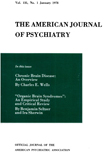OPEN WARD POLICY AT ST. LAWRENCE STATE HOSPITAL
Abstract
1. The open door mental hospital is not presented as anything new since the precedent for this type of administration occurred 75 to 100 years ago as can be found in many hospital records and in the proceedings the American Psychiatric Association.
2. The open ward is not presented as a new therapeutic panacea that will cure patients of their mental illness.
3. It restores to the patient his dignity and pride which a locked door and a key had removed from him.
4. It relieves the patient of symptoms and tensions which have been superimposed on his original mental illness because of locked doors, grates on the windows and any other type of restriction and restraining instruments.
5. Many of the patients develop a sense of responsibility and a renewed interest in life.
6. The open door affects every department in the hospital.
7. The success of this program depends upon the attitude of the director of the hospital and how this attitude is instilled and transmitted through the channels and accepted at the ward personnel level.
8. It is felt that the open door is a tremendous factor in a therapeutic program in that it reinforces every phase of the general program to help the patients either adjust better or become well enough to leave the hospital.
Access content
To read the fulltext, please use one of the options below to sign in or purchase access.- Personal login
- Institutional Login
- Sign in via OpenAthens
- Register for access
-
Please login/register if you wish to pair your device and check access availability.
Not a subscriber?
PsychiatryOnline subscription options offer access to the DSM-5 library, books, journals, CME, and patient resources. This all-in-one virtual library provides psychiatrists and mental health professionals with key resources for diagnosis, treatment, research, and professional development.
Need more help? PsychiatryOnline Customer Service may be reached by emailing [email protected] or by calling 800-368-5777 (in the U.S.) or 703-907-7322 (outside the U.S.).



